Frau Prof. Börries erhält den Deutschen Krebspreis 2025
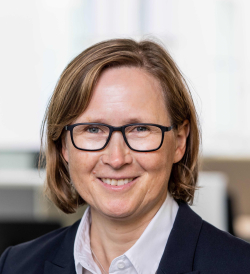
Mit medizinischer Bioinformatik hin zu personalisierter Krebstherapie.
Professorin Melanie Börries wird für ihre herausragenden Leistungen in der molekularen Onkologie und personalisierten Medizin mit dem Deutschen Krebspreis in der Kategorie „Translationale Forschung“ ausgezeichnet.
Im Fokus ihrer Arbeit steht unter anderem die Erforschung neuer Therapieansätze. So konnten ihre Erkenntnisse zur Inhibition der Rho-Kinasen ROCK1/2 die Grundlage für eine laufende klinische Studie bilden.
Auch in der Tumorforschung leistet Frau Börries Pionierarbeit: Mit Hilfe von Künstlicher Intelligenz analysiert sie die Tumormikroumgebung beim Pankreaskarzinom, um Therapieansprechen und Überlebenswahrscheinlichkeit besser vorhersagen zu können. Dabei kommen auch sogenannte Patient-derived Organoids (PDOs) zum Einsatz – Miniatur-Tumormodelle aus Patientenbiopsien, die eine personalisierte Testung von Therapieoptionen ermöglichen.
Darüber hinaus entwickelt Börries innovative Analyse- und Visualisierungswerkzeuge, die komplexe Sequenzierungsdaten klinisch nutzbar machen – sowohl für die Therapieentscheidung als auch für die Forschung.
Als Leiterin des vom BMBF geförderten Konsortiums „Personalisierte Medizin für die Onkologie“ (PM4Onco) und als Standortsprecherin des Deutschen Konsortiums für Translationale Krebsforschung (DKTK) prägt sie maßgeblich die Weiterentwicklung der personalisierten Krebsmedizin in Deutschland.
Congratulations to these achievements!
https://www.deutscher-krebspreis.de/preistraeger-innen-2025/translationale-forschung.html
The Jon van Rood award for 2025 goes to Janaki Vinnakota
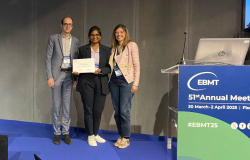 The prestigious Jon J. van Rood Award honors outstanding contributions in the field of hematopoietic transplantation immunology, like graft-vs-leukaemia/tumour effects, or development of innovative therapeutic approaches based on the engineering of immune effector cells. The prize is awarded yearly by the EBMT.
The prestigious Jon J. van Rood Award honors outstanding contributions in the field of hematopoietic transplantation immunology, like graft-vs-leukaemia/tumour effects, or development of innovative therapeutic approaches based on the engineering of immune effector cells. The prize is awarded yearly by the EBMT.
The EBMT Cellular Therapy & Immunobiology Working Party (CTIWP) awarded the Jon van Rood prize to junior PI and applicant for the next CRC1479 funding period Janaki Vinnakota.The award is based on her article in Nature Cancer 2024 „Targeting TGFβ-activated kinase-1 activation in microglia reduces CAR T immune effector cell-associated neurotoxicity syndrome“.
Congratulations!
https://www.ebmt.org/ebmt/news/ebmt-2025-annual-meeting-jon-j-van-rood-award-winners
CRC 1479 scientist receives prestigious Donnall Thomas Lecture Prize
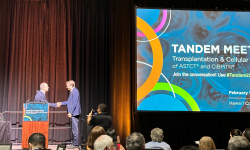
Prof. Dr. Robert Zeiser (P01) has been honored with the esteemed Donnall Thomas Lecture Prize by the American Society for Transplantation and Cellular Therapy. This prestigious award, presented in February 2025 at the society’s annual meeting in the USA, recognizes groundbreaking research in hematology.
Zeiser’s recognition stems from his exceptional work in translating laboratory findings into clinical trials, most notably the discovery of connections between oncogenes and immune escape mechanisms and the development of ruxolitinib as the global standard therapy for graft-versus-host disease. This achievement has significantly improved outcomes for patients undergoing stem cell transplantation.
The award holds particular significance as Prof. Zeiser is the first German recipient in 25 years, underscoring the international impact of his contributions to the field. His work continues to advance our understanding of blood and marrow transplantation, carrying forward the legacy of E. Donnall Thomas, the Nobel Prize-winning pioneer of bone marrow transplantation.
Prof. Dr. Robert Zeiser (P01, S02) was chosen to receive the Gottfried Wilhelm Leibniz Prize in 2025
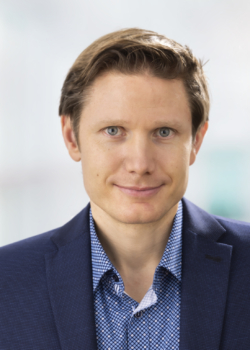 Prof. Zeiser is being honored for his groundbreaking work in the research and treatment of blood cancers, with a particular focus on transplant rejection and the immunological “cloaking” of tumors.
Prof. Zeiser is being honored for his groundbreaking work in the research and treatment of blood cancers, with a particular focus on transplant rejection and the immunological “cloaking” of tumors.
His research aims to provide new molecular insights into immune processes in tumor diseases and related rejection reactions after transplantation, with the ultimate goal of developing new drugs through clinical trials
The Leibniz Prize further cements Prof. Zeiser’s status as a leading figure in the field of blood cancer research and treatment and recognizes his significant contributions to improving patient outcomes and advancing our understanding of the complex immunological processes in cancer.
The €2.5 million prize is considered the most prestigious research award in Germany.
Congratulations to these achievements!
Preis für innovative Forschungsansätze in der Onkologie goes to Janaki Manoja Vinnakota
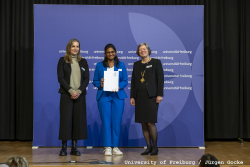 Dr. Janaki Manoja Vinnakota received the “Preis für innovative Forschungsansätze in der Onkologie“ for her PhD dissertation on „Neurological Complications Associated with Cancer Immunotherapies- Allogeneic Stem cell Transplantation, Immune Check Point Inhibition and CAR T cell Therapy“on the 10th October 2024 at the „Feierlichen Eröffnung des Akademischen Jahres“.
Dr. Janaki Manoja Vinnakota received the “Preis für innovative Forschungsansätze in der Onkologie“ for her PhD dissertation on „Neurological Complications Associated with Cancer Immunotherapies- Allogeneic Stem cell Transplantation, Immune Check Point Inhibition and CAR T cell Therapy“on the 10th October 2024 at the „Feierlichen Eröffnung des Akademischen Jahres“.
Congratulations!
Best poster award goes to Dr. Florian Ingelfinger
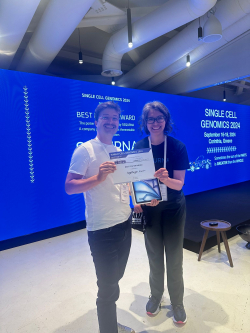
Dr. Florian Ingelfinger received the best poster award at the Single Cell Genomics Conference in Corinthia, Greece for his work on a Deep Learning Model.
ERC Consolidator grant goes to Nina Cabezas Wallscheid (P05)
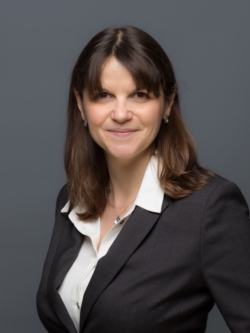
Jun 2024: The European research council (ERC) supports the work of Nina Cabezas Wallscheid (P05) project leader in the SFB1479 with 2 Million Euro. Congratulations!
CRC1479 Symposium „Oncogene driven immune escape“
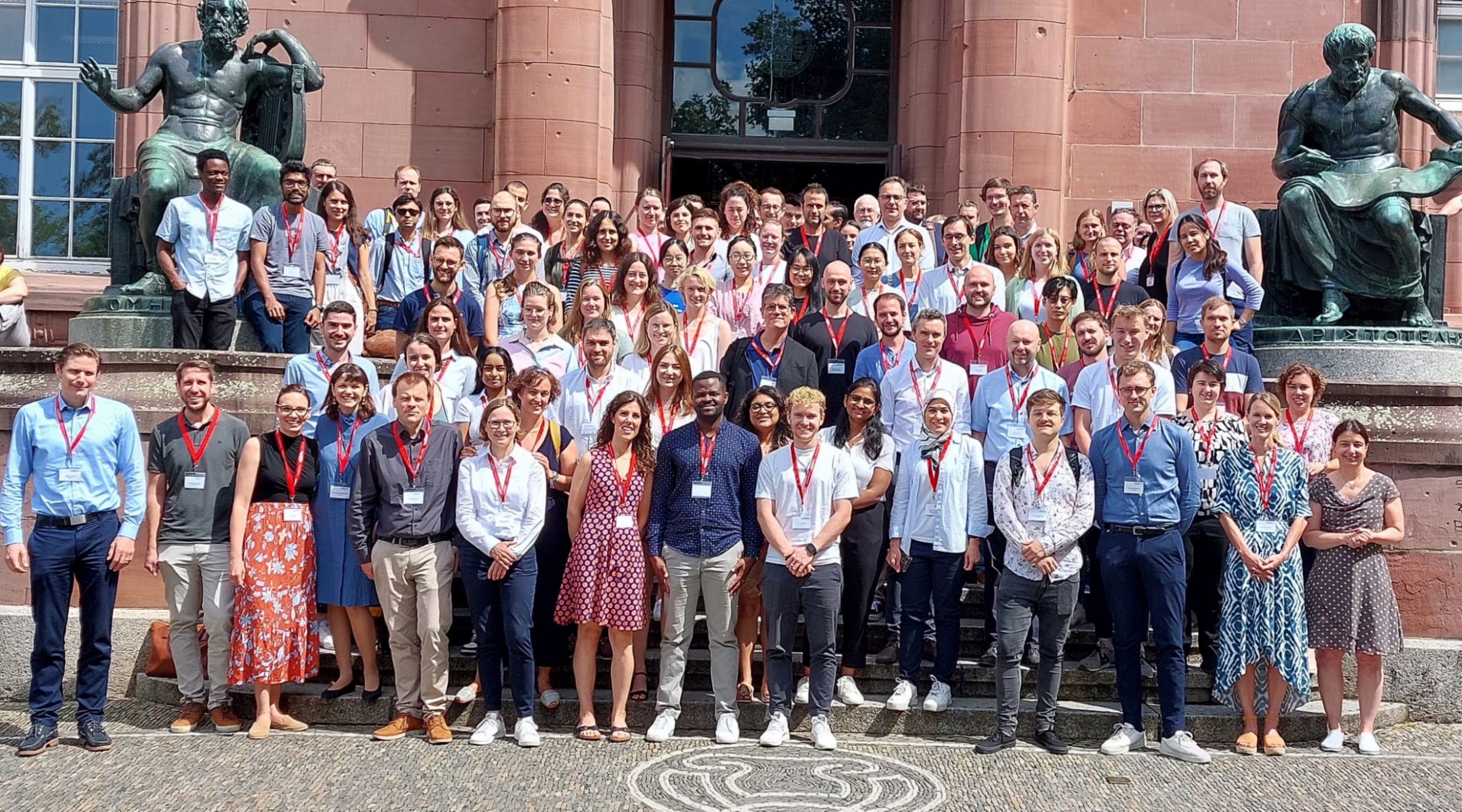 Our CRC1479 International Symposium took place from July 10th to 12th 2024 in Freiburg. This international Symposium covered new developments on the topic of oncogenes and mechanisms of immune escape. We feel that it was an exciting symposium with great keynote lectures by leaders in the field including Erika Pearce (Johns Hopkins University Baltimore), Dean Felsher (Stanford University), Vijay Kuchroo (Harvard Medical School) and Daniel Peeper (Netherlands Cancer Institute). Novel scientific data were discussed in oral presentations and poster sessions. The meeting offered great opportunities for scientific communication between our young investigators and more established scientist. Three young investigators were awarded with poster awards. The meeting gave us great inspiration for our ongoing work.
Our CRC1479 International Symposium took place from July 10th to 12th 2024 in Freiburg. This international Symposium covered new developments on the topic of oncogenes and mechanisms of immune escape. We feel that it was an exciting symposium with great keynote lectures by leaders in the field including Erika Pearce (Johns Hopkins University Baltimore), Dean Felsher (Stanford University), Vijay Kuchroo (Harvard Medical School) and Daniel Peeper (Netherlands Cancer Institute). Novel scientific data were discussed in oral presentations and poster sessions. The meeting offered great opportunities for scientific communication between our young investigators and more established scientist. Three young investigators were awarded with poster awards. The meeting gave us great inspiration for our ongoing work.
DKMS Mechtild Harf Science Award for CRC 1479 scientist
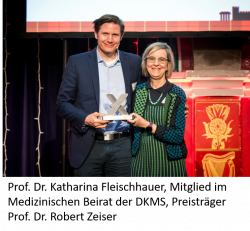
Prof. Dr. Robert Zeiser (P01/S2) receives the 2024 DKMS Mechtild Harf Science Award from the DKMS Stiftung Leben Spenden (Foundation for Giving Life) as honour for his outstanding research work in the field of allogeneic stem cell transplantation. With the DKMS Mechtild Harf Science Award, the foundation honours the lifetime achievements of internationally renowned physicians and scientists in the field of stem cell transplantation and cellular therapies.
“Professor Robert Zeiser’s findings in basic research into graft-versus-host disease have led to new therapeutic approaches that are changing practice and significantly improving the outcome for patients following stem cell transplantation. The same applies to his studies on the control of disease relapse after transplantation,” said Prof Dr Katharina Fleischhauer, member of the DKMS Medical Advisory Board and Head of the Institute for Cell Therapeutic Research at Essen University Hospital, in recognition of the award winner. The Head of the Department of Tumour Immunology and Immune Regulation and the Zeiser Laboratory at the Department of Internal Medicine I at the University Medical Center Freiburg accepted the award on 15 April 2024 in the presence of medical professionals and guests from all over the world at the EBMT (European Society for Blood and Marrow Transplantation) annual conference in Glasgow.
“Zeiser is one of the most internationally renowned scientists in the field of allogeneic stem cell transplantation, who has decisively advanced our understanding of the mechanisms of graft-versus-host disease (GvHD),” said Fleischhauer at the presentation of the Mechtild Harf Science Award, which is endowed with 10,000 euros. “The new therapeutic principles developed on the basis of his findings in the treatment of this serious complication are a prime example of successful translation of basic research to the patient’s bedside.”
New therapy for the treatment of life-threatening immune reactions
For the majority of patients with acute leukaemia, an allogeneic blood stem cell transplant is the only chance of a cure. However, the therapy is associated with risks: After the transplant, around one in two patients experiences a life-threatening immune reaction known as graft-versus-host disease (GvHD). Here, certain cells (the T cells) in the donor’s transplant recognise the recipient’s cells or organs as foreign and damage them. GvHD triggers painful inflammation in various organs. Around half of GvHD patients do not respond to standard immunosuppressive therapies such as cortisone and for a long time no other treatment option was available. Thanks to the work of Prof Zeiser and his team, this has changed. Through detailed research into the disease processes, they recognised that an active substance from the Janus kinase inhibitor family is able to inhibit the inflammatory messengers that occur in GvHD. With the help of an already approved cancer drug, the undesired reaction could be attenuated and partially prevented. The results of the initiated international multicentre phase III study led to the approval of ruxolitinib for the treatment of acute and corticosteroid-refractory GvHD.
Through further research, Zeiser and his team were able to prove that the acute immune reaction after a transplant often begins in the intestine because it loses its barrier function. “Our analyses showed that blood cancer cells can influence and even switch off the function of immune cells with the help of lactic acid. We now want to investigate exactly how these processes take place. Our aim is to find new, targeted therapies that can prevent serious complications after a stem cell transplant,” says Zeiser.
About the award
The Mechtild Harf Science Award of the DKMS Foundation for Giving Life has been honouring outstanding scientific work by renowned physicians in the field of stem cell donation and transplantation every year since 2001. It bears the name of the late wife of DKMS founder Peter Harf and mother of Katharina Harf, Chairwoman of the DKMS Foundation Board. Mechtild Harf suffered from leukaemia and a bone marrow transplant was the only treatment option. However, no suitable donor was found in her family. The mother of two children died in 1991.
Original press release on the DKMS website (in German)
Dr. Ho received the Karl Joseph Beck Award for her MD thesis
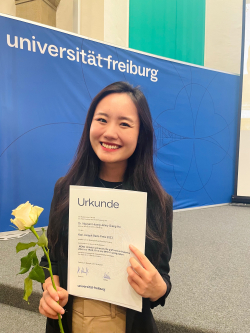
Dr. Ho has received the Karl Joseph Beck Award for her MD thesis in the AG Zeiser on the role of the p53/MDM2 axis for immune escape of leukemia cells from allo recognition.
Congratulations!


 The prestigious Jon J. van Rood Award honors outstanding contributions in the field of hematopoietic transplantation immunology, like graft-vs-leukaemia/tumour effects, or development of innovative therapeutic approaches based on the engineering of immune effector cells. The p
The prestigious Jon J. van Rood Award honors outstanding contributions in the field of hematopoietic transplantation immunology, like graft-vs-leukaemia/tumour effects, or development of innovative therapeutic approaches based on the engineering of immune effector cells. The p
 Prof. Zeiser is being honored for his groundbreaking work in the research and treatment of blood cancers, with a particular focus on transplant rejection and the immunological “cloaking” of tumors.
Prof. Zeiser is being honored for his groundbreaking work in the research and treatment of blood cancers, with a particular focus on transplant rejection and the immunological “cloaking” of tumors. Dr. Janaki Manoja Vinnakota received the “Preis für innovative Forschungsansätze in der Onkologie“ for her PhD dissertation on „Neurological Complications Associated with Cancer Immunotherapies- Allogeneic Stem cell Transplantation, Immune Check Point Inhibition and CAR T cell Therapy“on the 10th October 2024 at the „Feierlichen Eröffnung des Akademischen Jahres“.
Dr. Janaki Manoja Vinnakota received the “Preis für innovative Forschungsansätze in der Onkologie“ for her PhD dissertation on „Neurological Complications Associated with Cancer Immunotherapies- Allogeneic Stem cell Transplantation, Immune Check Point Inhibition and CAR T cell Therapy“on the 10th October 2024 at the „Feierlichen Eröffnung des Akademischen Jahres“.

 Our CRC1479 International Symposium took place from July 10th to 12th 2024 in Freiburg. This international Symposium covered new developments on the topic of oncogenes and mechanisms of immune escape. We feel that it was an exciting symposium with great keynote lectures by leaders in the field including Erika Pearce (Johns Hopkins University Baltimore), Dean Felsher (Stanford University), Vijay Kuchroo (Harvard Medical School) and Daniel Peeper (Netherlands Cancer Institute). Novel scientific data were discussed in oral presentations and poster sessions. The meeting offered great opportunities for scientific communication between our young investigators and more established scientist. Three young investigators were awarded with poster awards. The meeting gave us great inspiration for our ongoing work.
Our CRC1479 International Symposium took place from July 10th to 12th 2024 in Freiburg. This international Symposium covered new developments on the topic of oncogenes and mechanisms of immune escape. We feel that it was an exciting symposium with great keynote lectures by leaders in the field including Erika Pearce (Johns Hopkins University Baltimore), Dean Felsher (Stanford University), Vijay Kuchroo (Harvard Medical School) and Daniel Peeper (Netherlands Cancer Institute). Novel scientific data were discussed in oral presentations and poster sessions. The meeting offered great opportunities for scientific communication between our young investigators and more established scientist. Three young investigators were awarded with poster awards. The meeting gave us great inspiration for our ongoing work.





